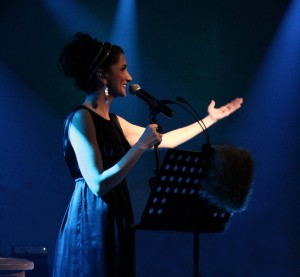Wer sich für libanesische Filme interessiert, hat mindestens einen ihrer Songs gehört: Tania Saleh hat Lieder für „Caramel“ und „Wer weiß, wohin“ der libanesischen Regisseurin Nadine Labaki geschrieben. Der Soundtrack schaffte es sofort auf Platz eins der meistverkauften Alben in Beirut; ebenso ihr aktuelles Album „Wehde“.
Für viele junge, alternative Musikerinnen in Libanon ist Tania Saleh ein Vorbild. Die Frau mit der wilden, dunkelbraunen Mähne und den sanften Augen nippt an ihrem Café au lait. Wir treffen uns in einem schicken Kaffeehaus in Beiruts christlichem Viertel Ashrafieh. Tania Saleh ist nicht nur Sängerin. Sie ist Künstlerin durch und durch: Sie malt und zeichnet, produziert und designt. Seit rund 20 Jahren arbeitet sie in der Werbebranche, um ihren Lebensunterhalt und das Geld für ihre Musik zu verdienen. Wie lange das noch möglich ist, weiß die Mutter zweier Söhne nicht. Ihr ältester Sohn fängt bald ein Studium an. „Da überlege ich zweimal, ob ich das Geld in ein neues Album stecke“, sagt Tania Saleh leise. In ihren CDs steckt mehr als nur ihr Geld: Jeder Song zeigt eine andere Facette von Tania Saleh. Mal ernst, mal traurig, mal verspielt. Jede Liedzeile hat eine eigene Botschaft, und Tania Saleh erzählt jede einzelne, während ihr Milchkaffee langsam kalt wird.
Ihr Album „Wehde“ ist vom ersten bis zum letzten Song durchkomponiert. Es erzählt die Geschichte eines jungen Mädchens, das in den 1940er Jahren lebt, als der Libanon unabhängig wird und eine Verfassung bekommt. Sie träumt davon, dass alle Menschen friedlich mit einander leben – ganz gleich, welcher Ethnie oder Religion sie angehören. Ein Traum, der bis heute in Libanon nicht Wirklichkeit geworden ist. „Wir sind zahlreiche Gruppen“, sagt Tania Saleh, „manchmal erscheinen wir Leuten, die von außerhalb kommen, wie Volksstämme.“ Mit ihrem Song „Omar und Ali“ fordert sie die beiden großen muslimischen Strömungen, die Sunniten und Schiiten, auf, gemeinsam einen Weg zu finden. „An einer Stelle heißt es in dem Song: Ihr müsst miteinander klar kommen, ob euch das gefällt oder nicht“, sagt Tania Saleh. Die Reaktionen darauf waren positiv. „Die Leute haben mir auf die Schulter geklopft – Bravo, bravo! – aber geändert hat sich nichts.“ Trotzdem gibt sie nicht auf. Sie sagt den Politikern in ihren Liedern, dass es reicht und dass sie nach mehr als 30 Jahren genug hat von den immer gleichen Gesichtern auf den Posten. Im Fernsehen oder Radio sind solche Songs nicht zu hören. Dafür bekomme sie im Internet großen Zuspruch. Und auch wenn das nicht wäre – Tania Saleh würde trotzdem die heißen Eisen anpacken, schon allein, um sich selbst treu zu bleiben.
Ein halb leerer Konzertsaal ist eine klare Botschaft
Als Studenten sie baten, auf einem Konzert singen, mit dessen Erlösen Menschen mit HIV geholfen werden sollte, hat sie keinen Moment gezögert – auch wenn das Thema in Libanon ein Tabu ist. „Es war das erste Konzert, das nicht ausverkauft war“, erinnert sie sich. „Der Saal war halb leer, und das war eine klare Botschaft: Wenn Du so etwas machen willst, unterstützen wir dich nicht mehr uneingeschränkt.“
In diesem Jahr will Tania Saleh ein neues Album veröffentlichen. Politisch wird es sein und die Umbrüche in der arabischen Welt aufnehmen. Und Tania Saleh verrät, dass wie beim Vorgänger „Wehde“ eine Frau im Mittelpunkt steht.
Links:
http://www.taniasaleh.com
https://www.facebook.com/taniasaleh
Tania Saleh: Every Album Tells a Story
Those who love Lebanese films have heard at least one of her songs for sure. Tania Saleh wrote the lyrics for “Caramel” and “Where Do We Go Now?” by Lebanese director Nadine Labaki. The soundtrack immediately made it number one in the bestselling albums in Beirut. The same goes for her recent record “Wehde”.
To many young alternative female musicians in Lebanon Tania Saleh is an example. We meet in a chic café in Beirut’s Christian quarter Ashrafieh. Tania Saleh, with untamed dark brown hair and tender eyes sips from her café au lait. She is not only a singer. She is an artist: She is drawing and painting, she produces music and she designs. For about 20 years she has been working in the advertising business, in order to make a living and to earn the money for her music projects. If she will be able to go on like this, Tania Saleh, mother of two Teenage boys, doesn’t know. Soon her eldest son will attend university. “Now I’m thinking twice before investing in a new album”, Tania Saleh says. In her albums is much more than only her money: Every song shows a facet of Tania Saleh. Sometimes serious, sometimes sad, sometimes playful. Every song line has its own message, and Tania Saleh recounts every single one, no matter if her milk coffee gets cold.
Her album is a composition from the first to the last song: It tells the story of a young girl, living in the 1940s as Lebanon gets independent and a constitution is written. This girl dreams of a country where all people are living together in peace – regardless of their ethnic or religious background. “We are several communities”, Tania Saleh says, “sometimes we look like tribes to people coming from abroad.” With her song “Omar and Ali” Tania Saleh calls for cooperation between the two main Muslim group, the Sunnis and the Shiites. “At one point in the song it says: You have to deal with each other whether you like it or not”, Tania Saleh says. The feedback to this song was positive. “People clapped me on the shoulder – bravo, bravo! – but nothing changes.” Still she doesn’t give up. In her songs she shouts out to politicians that it is enough and that after more than 30 years with always the same faces in the same positions people are longing for a change. Those songs do not appear on TV or on the radio, but on the internet Tania Saleh receives a lot of support. And even without that she would point on crucial matters in order to be true to herself.
When students asked her to perform at a benefit concert to help people with HIV, Tania Saleh didn’t hesitate for a single second – although this is a taboo in Lebanon. “It was my first concert that was not full”, Tania Saleh remembers, “It was half empty, and that was a clear message: If you want to do stuff like that, you have to be aware that we are not going to support you.”
In 2014 Tania Saleh wants to publish a new album. It will talk about politics and the current changes and uprisings in the Arab world. As in her previous record “Wehde” she will tell the story of a women, Tania Saleh reveals.

